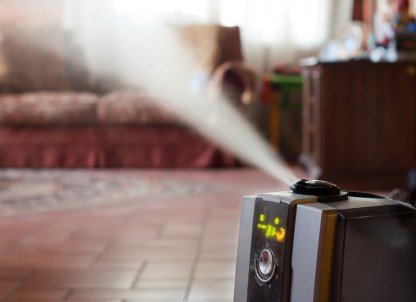How To Prevent Getting Sick: Address What Causes Colds and Flu to Spread
 Respiratory infections, commonly known as colds, are some of the most common health complaints worldwide. While bacteria can sometimes be the cause, viruses are to blame in up to 90% of cases.[1]
Respiratory infections, commonly known as colds, are some of the most common health complaints worldwide. While bacteria can sometimes be the cause, viruses are to blame in up to 90% of cases.[1]
Have you ever wondered what causes colds and the flu to be much more common in the winter? It’s not just cold weather–research shows that respiratory infections and viruses like influenza are more common and spread easier at lower humidity.[2,3] A drop in humidity and temperature together are associated with the strongest risk for getting the flu.[3]
How does humidity affect the spread of illness?
Some viruses, like influenza, are more stable in cool, dry air.[4] One study demonstrates that influenza and other common viruses live longer at lower relative humidity.[5] Conversely, the stability of the influenza virus is very low at high humidity levels of 60% to 80%.[6]
Another reason for the link between low humidity and susceptibility to infection lies in the effect of dry air on the respiratory tract. Low humidity can dry out the mucosal membrane that lines our respiratory system, damaging the tissue and impairing the ability of this lining to protect us from infection.[2,3]
Finally, low humidity can improve transmission of viruses. Viruses are transmitted in droplets of water; at low humidity, the droplets stay smaller and thus stay airborne longer than their larger, heavier counterparts that are present at high humidity. One study found that a low humidity of between 20% and 30% is most favorable for the transmission of these viruses. On the other hand, transmission was completely blocked at a high humidity of 80%.[6]
How to prevent getting sick: try a humidifier
Using a humidifier to raise the humidity of your home or work space can help to limit your exposure to the flu and other viruses that might get you sick. One study looking at the humidity in grade school classrooms estimated that the chance of a virus surviving one hour could decrease from approximately 75% to 35% if the indoor absolute humidity were raised using a humidifier set to 60% relative humidity.
The researchers conclude that raising classroom humidity levels in the wintertime to levels typical of spring and fall could reduce the transmission of the influenza virus in schools significantly.[7]
This same technique can be used in your home to reduce your risk of getting sick if you live in a dry, cold climate in the winter. Try setting a humidifier to high relative humidity, around 60%. But be cautious when using a humidifier; if you keep your home too humid, you run the risk of causing mold. Mold can be dangerous and cause its own share of health problems, so don’t overdo it. Use the humidifier only as much as necessary, and check your home often for signs of mildew or mold damage.
Share your experience
Do you use a humidifier in your home? Do you find it helps to keep you from getting sick? Share your tips for preventing colds and the flu in the comments section below.
[1] Epidemiol Infect. 2014 Jul;142(7):1375-83.
[2] J Virol. 2014 Jul;88(14):7692-5.
[3] Environ Health. 2014 Mar 28;13(1):22.
[4] Respir Med. 2009 Mar;103(3):456-62.
[5] Int J Chron Obstruct Pulmon Dis. 2014 Oct 6;9:1101-10.


 Spotlight on Supplements: Mangosteen
Spotlight on Supplements: Mangosteen  Personal Beliefs About Drugs Influence Brain Activity
Personal Beliefs About Drugs Influence Brain Activity  Hearing Aids Extend Longevity
Hearing Aids Extend Longevity 